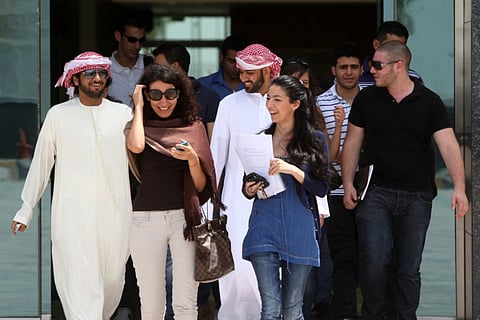Some universities unclear about new ministry standards
Awaiting details how new licensing, accreditation standards apply in free zones

Dubai: A day after the Ministry of Education announced new licensing and accreditation standards for all universities, it is not clear how standards will apply to some universities in Dubai free zones.
The ministry on Monday said the new standards, which come into effect this September, “have been developed to cover the licensing and accreditation of all types of higher education institutions, including … free zone universities”.
Branch campuses
In Dubai free zones, such as Dubai International Academic City (DIAC), there are a number of branch campuses of international universities.
According to the website (www.khda.gov.ae) of Dubai’s Knowledge and Human Development Authority (KHDA), which is tasked to ensure the quality of higher education institutes in Dubai free zones, “branch campuses of international universities may choose to come under the [KHDA’s] University Quality Assurance International Board (UQAIB) quality assurance scheme, or they may choose to be licensed and accredited by the [ministry’s] Commission for Academic Accreditation (CAA).
“All other private higher education institutions in a free zone must be licensed and accredited by the CAA”.
Unaccredited universities
The KHDA does not accredit universities’ programmes and a number of branch campus of international universities have not been accredited by the ministry.
Gulf News has requested the KHDA and the ministry for more details regarding how Monday’s announcement affects local and foreign higher education institutes in Dubai free zones.
A number of universities had no immediate comment on the ministry’s announcement, saying they were awaiting more details.
The ministry had said in the announcement that the new standards aim to ensure the quality of higher education, with rewards for high quality providers and stringent processes for lower quality providers.
‘Students benefit’
Welcoming the ministry’s announcement, some universities said the move will ultimately benefit students.
Glyn Watson, Provost, University of Birmingham Dubai, said: “As a global ‘Top 100 QS-ranked university’ that has just announced plans for a new state-of the-art campus in Dubai, which opens in 2021, the University of Birmingham welcomes any initiative that helps to raise the profile and quality of higher education institutes’ provision in the UAE. It is good for the university, the country, and most importantly of all, students, who will be all the more employable in what is a very competitive jobs market. We are particularly supportive of the risk-based approach that the ministry appears to be taking to the new quality assurance regime.”
The university, located in DIAC, says on its website (www.birmingham.ac.uk/dubai/): “We offer degrees that will be taught, examined and accredited to the same high standards as those delivered on its UK campus and are approved by the … KHDA …”
Nitin Anand, executive director of Skyline University College in Sharjah, which is accredited by the ministry, said: “The new standards are designed in such a way that the measures and indicators are so specific, which makes it very clear as to how the higher education institutions are being ranked and classified, which gives more confidence to students about the level of the quality of education they are receiving.”



![Social media claims of cancellations dismissed; official updates to be shared through authorised channels. [Illustrative image]](http://media.assettype.com/gulfnews%2F2025-11-15%2Fx2mp12df%2Fexam.jpg?w=320&auto=format%2Ccompress&fit=max)